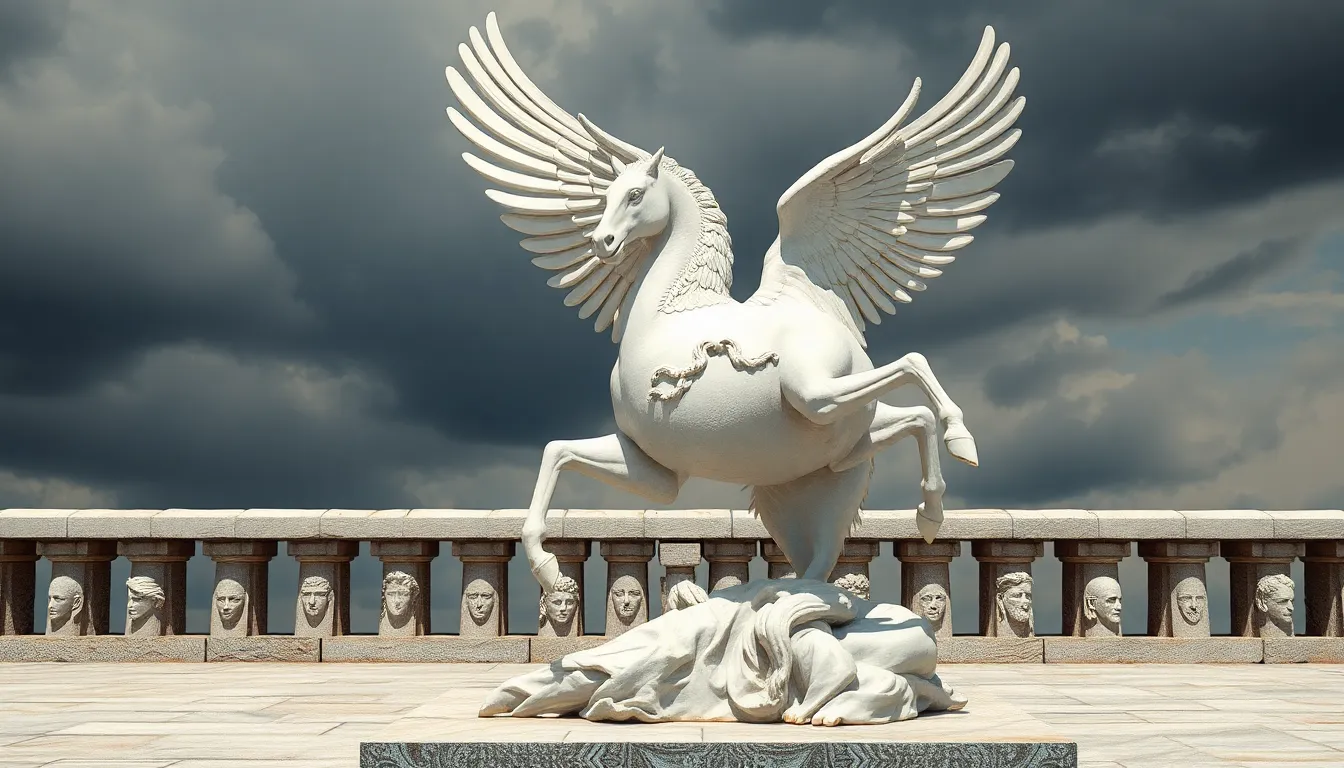The Significance of Pegasus in Greek Religion and Worship
I. Introduction
In the rich tapestry of Greek mythology, few figures are as captivating as Pegasus, the winged horse that embodies both beauty and grace. Born from the blood of the slain Gorgon Medusa, Pegasus represents the duality of creation and destruction. This article explores the significance of Pegasus within the context of Greek religion and worship, examining its origins, symbolism, and cultural impact.
II. The Origins of Pegasus in Greek Mythology
A. Birth and lineage of Pegasus
Pegasus emerged from the decapitated head of Medusa, one of the three Gorgon sisters, after she was slain by the hero Perseus. His lineage is notable for its connections to both divine and monstrous elements:
- Connection to Medusa and Poseidon: Pegasus is often considered the offspring of Medusa and Poseidon, the god of the sea. This connection links Pegasus to both the chaotic and the divine.
- Symbolism of birth from chaos: His birth from Medusa’s blood can be seen as a representation of beauty emerging from chaos, a common theme in mythology.
B. Role in Greek myths and tales
Throughout various myths, Pegasus is portrayed as a noble creature. He is best known for his association with the hero Bellerophon, who rode him in his quest to defeat the Chimera. This partnership symbolizes the union of human aspiration and divine assistance.
III. Pegasus as a Symbol of Inspiration and Art
A. Association with the Muses and creativity
Pegasus holds a special place in the arts and literature of ancient Greece. He is often linked to the Muses, the goddesses of inspiration for the arts and sciences.
B. The role of Pegasus in poetry and literature
In many literary works, Pegasus is depicted as a source of inspiration for poets and writers. His flight symbolizes the elevation of the human spirit and the pursuit of creativity.
C. Artistic representations of Pegasus in ancient Greek art
Ancient Greek art frequently portrayed Pegasus in various forms, including pottery, sculptures, and frescoes. These representations highlight his majestic presence and the admiration he commanded in Greek culture.
IV. Worship and Cult of Pegasus
A. Locations of worship
While Pegasus did not have a formal cult like many of the Olympian gods, he was nevertheless revered in certain locations. Notable sites include:
- Mount Helicon: Known as the home of the Muses, this mountain was central to the worship of Pegasus.
- Delphi: The oracle site also recognized Pegasus as a symbol of divine inspiration.
B. Ritual practices and offerings
Rituals dedicated to Pegasus often involved offerings of poetry and song, celebrating his role as a muse. Poets would recite their works in his honor, hoping to invoke his inspiration.
C. Festivals and celebrations honoring Pegasus
Festivals celebrating artistic expression often included references to Pegasus, emphasizing the connection between creativity and divine inspiration.
V. Pegasus in the Context of Heroic Journeys
A. Relationship with heroes, particularly Bellerophon
The relationship between Pegasus and Bellerophon is one of the most significant narratives in Greek mythology. Bellerophon, a mortal hero, was able to tame Pegasus, which symbolizes the mastery of one’s own aspirations and the pursuit of greatness.
B. Symbolism of flight and transcendence
Pegasus represents the ideal of transcendence—rising above earthly challenges and limitations. His flight symbolizes the human spirit’s capacity to achieve greatness.
C. Lessons learned from heroic narratives involving Pegasus
The stories involving Pegasus often convey important moral lessons about hubris, the balance of power, and the consequences of one’s actions. Bellerophon’s eventual downfall serves as a cautionary tale about the dangers of overreaching ambition.
VI. The Duality of Pegasus: Power and Fragility
A. Pegasus as a powerful creature
Pegasus embodies immense power as a creature capable of flight, representing freedom and the divine nature of inspiration. This power is often depicted in his ability to aid heroes in their quests.
B. Themes of control and chaos in mythology
Despite his power, Pegasus also symbolizes fragility. The struggle to control such a magnificent creature reflects the broader themes of chaos and order found in Greek mythology.
C. The significance of Pegasus’ eventual fate
Pegasus’s fate, soaring into the heavens to become a constellation, symbolizes the transcendence of the soul and the eternal nature of inspiration, suggesting that while earthly forms may perish, their essence can live on.
VII. Pegasus in Modern Interpretations and Cultural Impact
A. Influence on contemporary art and literature
Pegasus continues to inspire artists and writers in modern times. His image is prevalent in literature, film, and visual arts, symbolizing creativity and the pursuit of dreams.
B. Pegasus as a symbol in modern spirituality and pop culture
In contemporary spirituality, Pegasus is often viewed as a symbol of enlightenment and freedom. In pop culture, he appears in various forms, from novels to movies, representing the timeless nature of mythological figures.
C. The enduring legacy of Pegasus in global mythology
The figure of Pegasus has transcended Greek mythology, influencing various cultures around the world. His legacy can be seen in the ways different societies celebrate creativity and the human spirit.
VIII. Conclusion
Pegasus holds a significant place in Greek religion and worship, representing the intersection of creativity, inspiration, and heroic aspiration. His story teaches us valuable lessons about the balance between power and fragility, ambition and humility. The lasting impact of Pegasus, both in ancient and modern contexts, underscores the timeless nature of myth and its relevance to the human experience.




